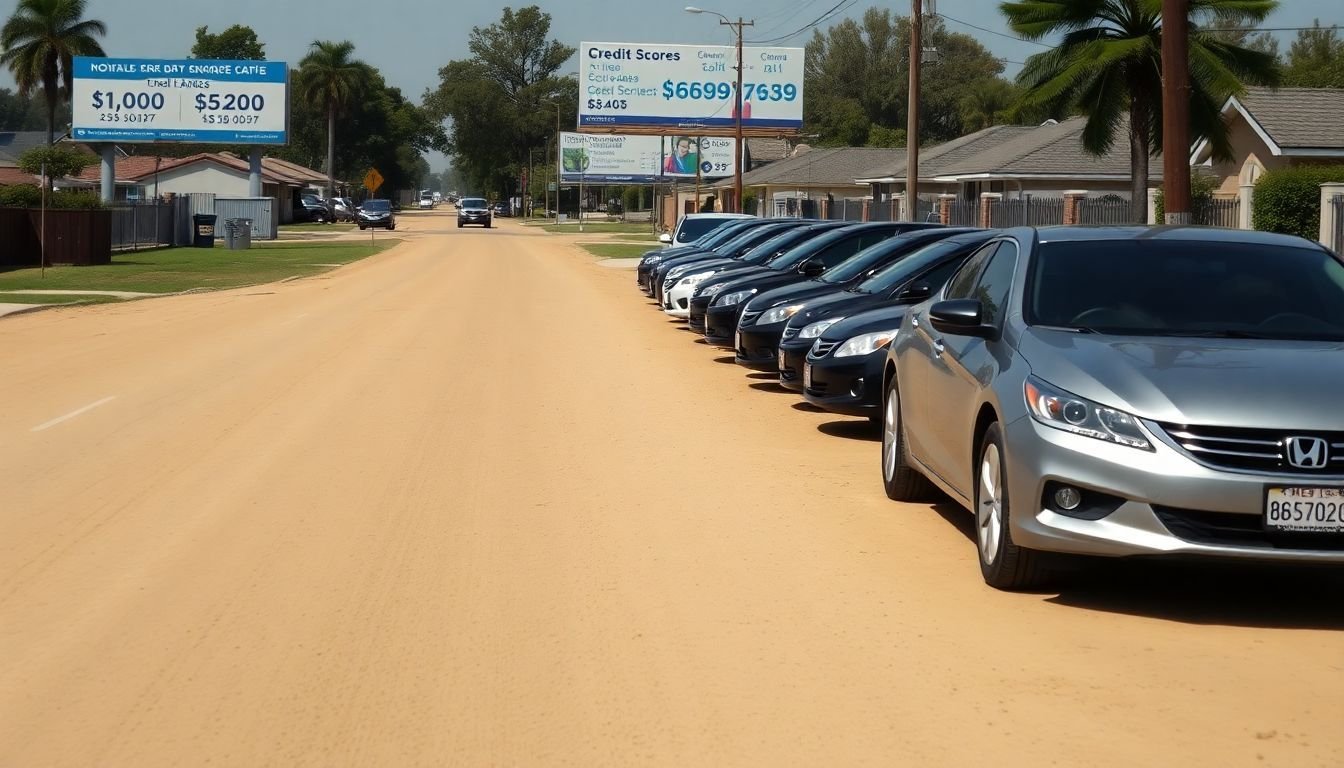Looking for the best deal on a new car can feel hard. You want to save money, but finding the right price seems tough. One key thing affects your car deal a lot: your credit score.
Your credit score decides if you get a good loan for buying cars like Toyota Camry or Mazda CX-30. This article will show how to make your credit score better before you buy a car.
Get ready to learn how to get that great car deal!
Key Takeaways
- Your credit score affects the car deal you get. A high score means lower interest rates.
- Fix mistakes on your credit report to improve your score. This helps you save money.
- Pay bills on time and keep credit card balances low. These steps boost your score.
- Compare paying cash with getting a loan for a new car. Each choice has pros and cons.
- Shop for cars in August when dealers offer discounts to clear out old models.
The Role of Credit in Car Purchases

Your credit score plays a big part in car buying. It can change the deal you get on a new car.
How credit affects car deals
Your credit score plays a big role in car deals. If your score is high, you get better interest rates on your car loan. This means you pay less for your new or used car over time. Dealers look at your credit to decide if they can offer you financing deals or special offers like low-interest rates or cash back.
People with lower scores may not get these good deals. They might have to pay more each month and more overall for their cars. So, improving your credit score before buying a car can save you money.
A good credit score opens the door to better financing options for buying a new car.
Boosting your credit score
Boosting your credit score is key to getting the best deal on a new car. Start this process six months before you plan to buy a car.
- Check your credit reports regularly. Obtain reports from major bureaus like Experian, Equifax, and TransUnion. Look for mistakes or old debts that should be removed.
- Fix errors in your reports right away. Report any mistakes to the credit bureau that listed them. This can help improve your score quickly.
- Pay bills on time every month. Late payments hurt your credit score. Set reminders or use automatic payments to stay on track.
- Keep credit card balances low. Try not to use more than 30% of your available credit on each card.
- Pay down existing debt as much as possible. Lowering your overall debt improves your credit utilization ratio, which helps raise your score.
- Don’t close old credit cards, even if you don’t use them anymore. Having a longer credit history can boost your score.
- Limit new credit applications before buying a car. Each application can cause a slight dip in your credit score.
- If you have little or no credit history, consider getting a secured credit card or becoming an authorized user on someone else’s account to start building credit.
Following these steps carefully ensures you are in the best position to negotiate when it comes time to purchase that new Subaru Impreza or Hyundai Sonata you’ve been eyeing, possibly securing lower interest rates and better terms on your loan.
Enhancing Your Credit Rating
To get a better credit score, start by checking your credit reports often. Fix any mistakes and watch how you use your credit cards to help raise your score.
https://www.youtube.com/watch?v=3uJ307-5qvQ
Reviewing your credit reports frequently
Checking your credit reports often is key to understanding your financial health. This can also help you find and fix any mistakes that might hurt your credit score. Here’s what you need to do:
- Get a copy of your credit report from each of the three main credit bureaus: Equifax, Experian, and TransUnion. You can do this for free once a year through AnnualCreditReport.com.
- Look over each report closely. Check for any errors, like payments marked late when you paid on time or debts listed that aren’t yours.
- Find any mistakes? Contact the credit bureau right away. Each bureau has its own process for fixing errors, but they usually require you to send a dispute letter.
- Send proof with your dispute letter. This could be payment records or letters from creditors saying an account was closed.
- Keep track of all communications with the bureaus. Note the dates you sent letters or made calls.
- Follow up if needed. Sometimes bureaus take time to fix errors, so check back to make sure they corrected your report.
- Understand hard inquiries on your report. These happen when you apply for new credit and can lower your score slightly for a short time.
- Limit the number of times you apply for credit before buying a car since multiple hard inquiries might lower your score more.
- Maintain a good mix of credit types if possible, like a mortgage, car loan, and credit cards, showing lenders you can handle various kinds of debt responsibly.
- Always pay bills on time every month since payment history is a big part of your credit score.
- Work on lowering large debts as much as possible because how much debt you have compared to your limit also affects your score.
- Watch out for identity theft by looking for accounts or charges you don’t recognize.
Correcting report errors
Errors in your credit report can hurt your chances of getting a good deal on a new car. Fixing these mistakes is key to improving your score and securing better financing options.
- Get a copy of your credit report from major bureaus. Under law, you’re entitled to one free report each year from Equifax, Experian, and TransUnion.
- Look closely at the details. Check for any wrong information like missed payments you made on time or debts that aren’t yours.
- Gather proof for any errors you find. This could be bank statements or payment records.
- Contact the credit bureau with the mistake. Write a letter explaining the error and include copies (not originals) of your proof.
- Send the same information to the creditor listed with the error, like your credit card company or auto loan provider.
- Wait for a response. The bureau usually investigates within 30 days and will remove errors if they find them.
- Check your report after 45 days to make sure they fixed the mistake.
This process helps ensure lenders see your true credit history when you apply for a car loan, leading to better interest rates and car deals.
Managing credit card use
To handle credit card use well, keep balances below 30% of your credit limit. This helps raise your score. Pay off what you owe before the statement ends to show a $0 balance on reports.
Keeping your credit utilization low and paying off balances early can boost your financial health.
Use this advice to get lower interest rates on loans, such as for cars or houses. It makes borrowing money cheaper in the long run.
Evaluating Car Financing Choices
Looking at car financing choices means comparing paying in full with borrowing money. It’s smart to look at interest rates and how long you have to pay back the loan before choosing the best time to buy a car.
Comparing cash payments and loans
Deciding between cash payments and loans for your new car is a big choice. This decision affects your finances. It’s crucial to understand the pros and cons of each option. Below is a detailed comparison that aims to assist you in making an informed decision.
| Payment Method | Pros | Cons |
|---|---|---|
| Cash Payments |
|
|
| Loans |
|
|
Keep in mind, while savings account interest rates hover around 1%, opting for a loan could mean higher expenses due to interest. However, if your credit is strong, you might qualify for 0% financing offers from car dealers. This unique situation could make a loan more appealing than paying outright with cash. Always compare the long-term costs of each option before deciding.
Examining interest rates and loan terms
Understanding interest rates and loan terms is key to getting a good deal on a new car. Your credit score plays a big role in this. People with higher credit scores usually get lower interest rates. If you have a good history with a lender, you might get even better rates.
Here’s a simple table to help you see how different rates and terms can affect your car loan:
| Credit Score Range | Interest Rate (Estimated) | Loan Term Options |
|---|---|---|
| Excellent (720+) | 3% – 5% | 36, 48, 60, 72 months |
| Good (690-719) | 5% – 10% | 36, 48, 60 months |
| Average (630-689) | 10% – 15% | 36, 48 months |
| Poor (Below 630) | 15%+ | 36 months |
Shorter loan terms mean higher monthly payments, but you’ll pay less in interest over time. Longer terms lower your monthly payments but increase the total interest paid. Aim for the shortest term you can comfortably afford.
Improving your credit score before you apply can help lower these rates. Regularly check your credit report for errors and work on fixing them. Keep your credit card balances low and make payments on time. This effort can save you a lot of money when you’re ready to buy a car.
Choosing the best time to buy a car
August is your golden chance for car shopping. Dealers want to clear out old models because new ones come in the fall. They offer big discounts and special deals then. You might see lower prices or extra incentives on cars, including hybrids and electric vehicles.
Look at manufacturer’s suggested retail price but focus on what deals are out there.
Before you buy a car, think about if you’ll need a loan soon for something big like a house. It’s smart to avoid getting a car loan right before that. Loans can make it hard to borrow more money soon after.
Keep this in mind as you plan when to buy your next vehicle.
Securing the Best Car Deal
Learn the tricks to secure the best deal on a new car by understanding dealership margins and using negotiation tools. Explore how to get more value for your money.
Learning about dealership margins
Dealership margins might surprise you. People often think dealers make big money from each car sale, but the truth is different. On a $30,000 vehicle, dealers usually make only 3.8% profit.
This means they earn around $1,140 from selling that car. Knowing this can help you understand the sticker price better.
Understanding dealer margins lets you see behind the sticker price and Kelley Blue Book values. It guides you in negotiations for new car deals or trade-in values. You gain insight into how much room there is to lower prices or add customer cash without hurting the dealer’s bottom line too much.
Employing negotiation tools
Negotiating for a new car can feel tough. Using the right tools makes it easier and can help you get a great deal. Here’s how:
- Use TrueCar to see what others paid for the car you want. This gives you a strong starting point for your talks.
- Bring up car incentives you have found during your search. Letting the seller know you’re aware of these can lower the price.
- Show comparisons from consumer reports and other buyers’ experiences with similar cars like Infiniti or Acura. This shows you’ve done your homework.
- Mention if you’re looking at other vehicles, such as Hyundai Ioniq 5 or Tesla models, to show them you have options.
- Talk about dealership margins on the model you’re interested in. Be polite but clear that you know there’s wiggle room in their initial offer.
- Discuss financing offers from outside sources if they’re better than what the dealership offers. It could lead them to offer more competitive rates.
- Point out any extras that don’t add value for you, like extended warranties or upsell items, and ask to remove them from the deal.
- If buying used, bring up any issues found in the vehicle’s history report from services like Edmunds, pushing for a discount if there are concerns.
- Ask about last year’s models or ones with less popular colors that might be priced to move.
- Look into customer loyalty programs if this isn’t your first purchase of the same brand (e.g., Honda Accord or Subaru Impreza RS) and use it as leverage.
Each step lets both sides feel they’ve won: You get a good deal, and they make a sale.
Conclusion
Your credit plays a big part in getting a good car deal. Work on your score before you shop for a car. Check your credit report every year and fix any mistakes. A better score helps you get lower loan rates.
This means you pay less over time. When you’re ready, compare loans from different places to find the best rate. Your smart moves with credit can lead to great savings on your new car.
FAQs
1. What factors influence the best car deals?
The best car deals often depend on several factors including your credit score, down payment, vehicle pricing and brand loyalty. Additionally, the type of vehicle such as hybrid cars or luxury vehicles can also impact the deal.
2. How does my credit affect car finance options?
Your credit plays a significant role in determining your eligibility for subsidized rates and low down payments which could lead to better deals on vehicles like minivans or midsize SUVs from brands like Kia Sorento or Subaru Solterra.
3. Can I negotiate invoice prices with salespeople when buying a new car?
Yes! The window sticker price is not always final. You have room to negotiate with the salesperson about invoice prices especially if you’ve done your research around taxes, discounts available for specific models like Nissan Altima or Volkswagen Jetta.
4. Are there any safety considerations while choosing a new vehicle?
Absolutely! It’s important to consider safety ratings by organizations such as Insurance Institute for Highway Safety (IIHS). For instance, all-wheel drive options might offer more stability in winter conditions compared to others.
5. Does technology play any role in getting good deals on cars?
Indeed it does! Many customers are attracted by advanced features like Apple CarPlay which can increase resale value later on. Moreover, EVs and Hybrid SUVs are gaining popularity due to their eco-friendly nature that could potentially fetch good returns upon reselling.
6. Is it possible to get good deals on used cars too?
Certainly! Used cars can be an economical option if chosen wisely considering various aspects such as the condition of tires, maintenance history etc., along with checking out advertisements for potential bargains.
- Discover 10 Employee Health Benefits Cheaper Than Insurance In 2024 - November 9, 2024
- 4 Common Money Mistakes Parents Make And How To Avoid Them - November 9, 2024
- Mastering Your Retirement Strategy: Essential Steps For Financial Security - November 9, 2024














